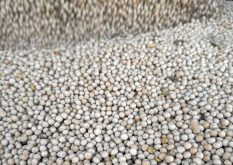Lack of rain in the states of Western Australia and South Australia may see harvests fall below the 10-year average
Glacier FarmMedia – WINNIPEG — Dry conditions in Western and South Australia may cause declines in the upcoming Australian wheat and barley crops, according to the U.S. Department of Agriculture’s attaché in Canberra.
In a USDA Global Agricultural Information Network report released April 29, the attaché forecasted wheat production at 25.8 million tonnes for the 2024-25 marketing year, slightly below the 26 million produced the previous year and three per cent lower than the 10-year average. Seeded area is expected to total 29.653 million acres for the upcoming marketing year, down from 30.641 million in 2023-24.
Read Also

Canola used in only quarter of Canadian biofuel
Less than one-quarter of the biodiesel and renewable diesel used in Canada in 2024 was made from canola oil feedstock
While wheat growing areas in the eastern states of Queensland, New South Wales and most of Victoria received average to above-average rainfall, which replenished soil moisture levels, those in the western half of the country haven’t yet seen fall rains. No significant rainfall was forecast for Western Australia until early May.
Wheat exports for 2024-25 were projected to be 17.5 million tonnes, down from 20 million the previous year, because of a drawdown in stocks. Australia typically ranks top five in global wheat production each year. Ending stocks for 2024-25 were estimated at 3.321 million tonnes, 500,000 more than the previous year.
Barley, which is grown in the same areas as wheat in Australia, was projected to be virtually unchanged in production at 10.9 million tonnes for 2024-25, up from 10.8 million the previous year but down from the 10-year average of 11.3 million. However, seeded area is slated to go up 494,210 acres from the year before at 10.87 million. Projected exports would be down two million tonnes at five million due to a drawdown in the large stocks built up over the past three years.
Ending stocks are expected to decline by 100,000 tonnes at 1.17 million.


















